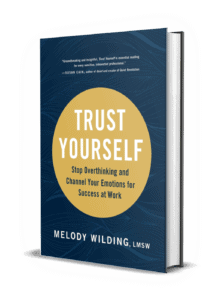How do you control your anger at work?
At one point or another, we’ve all felt totally irritated while at work: You pull an all-nighter on a project that then gets scrapped, a client criticizes your team for no apparent reason or your co-worker shows up late for a meeting again, dumping all the prep work on you.
Anger can be a complicated emotion, especially if you consider yourself to be a Sensitive Striver. Because you strive for excellence and place high expectations on yourself, you may internalize your emotions more deeply. When anger arises, it may overwhelm you, causing you to shut down or retreat. You may suppress your feelings altogether in an attempt to maintain your status as “the nice person” who doesn’t cause conflict. You may also doubt yourself. You wonder, “Am I wrong for feeling this way? Shouldn’t I just brush it off and keep going?”
Here’s the thing: experiencing anger at work is completely normal from time to time. Better yet, there are ways you can control your anger constructively and keep your reputation intact.
Common Trigger for Anger at Work
There are many reasons why you might feel irritated throughout the day. Common triggers for anger at work include:
1. Unfair treatment. Feeling that you are being treated unjustly or witnessing others being treated unfairly can evoke anger. This could include favoritism, discrimination, or unequal opportunities.
2. Little recognition or appreciation. When your efforts, contributions, or achievements go unnoticed or unappreciated, it can lead to frustration and feeling undervalued.
3. Poor communication. Ineffective or unclear communication within the workplace, such as lack of transparency or passive aggressive behavior can trigger anger.
4. Too much work. Being overwhelmed with a heavy workload or facing unrealistic deadlines and expectations can lead to stress and losing your cool.
5. Lack of control or autonomy. No one likes to be micromanaged. Having limited decision-making authority can feel minimizing and like someone doesn’t trust you.
6. Conflict. Tough conversations, whether disagreements or difficult relationships with colleagues, supervisors, or subordinates, can send your annoyance soaring.
7. Not enough resources or support. Insufficient resources, like the lack of necessary tools or technology or a lack of support from colleagues or superiors, can block your productivity.
8. Organizational changes. Restructuring, downsizing, or reassignments can create feelings of uncertainty that lead you to lash out.
Get exclusive access to Chapter One of my book, Trust Yourself: Stop Overthinking and Channel Your Emotions for Success at Work. By submitting this form you consent to receive newsletters and promotions via email. Unsubscribe or opt-out any time. See our Privacy Policy.Free BOOK CHAPTER
Turn your sensitivity into a strength and regain your confidence at work
Your Brain on Anger
These office aggravations can make your blood boil. Your focus is immediately hijacked from the important task at hand. It can feel almost impossible to control your anger.
When anger kicks in, it’s like a firework going off in your brain, activating the sympathetic nervous system. Your mind goes into fight-or-flight mode, and you become reactionary, not thinking clearly, blaming others, or beating yourself up for getting upset. In this state, you’re prone to poor judgments and saying things you may regret later.
Your amygdala, the primal part of your brain responsible for emotions, goes into overdrive. When the amygdala takes control, it can override the prefrontal cortex, impairing your ability to think rationally and make sound judgments. That’s why you might say or do things in the heat of the moment that you later regret.
Your nervous system also sends out a surge of chemicals, including adrenaline and cortisol, preparing your body for action. Physiologically, your heart rate increases, your blood pressure rises, and your muscles tense up.
Ways to Control Your Anger at Work
It’s perfectly natural to experience a wide range of emotions in the workplace—including anger. Negative emotions are bound to come up on the job just as they do in our personal lives – and that’s not a bad thing.
Learning to productively communicate your emotions is key to boosting your emotional intelligence, which can make you a better leader and boost success across the board. In fact, getting fired up can motivate you and give you more focus to solve the problem at hand.
Learning to control your anger in a constructive, professional way can help you channel your frustration and get what you want — without earning you a reputation as the person in the office who can’t control their temper.
Here are five ways to control your anger when work’s driving you nuts:
1. Don’t Fight The Feeling
When anger arises, we’re often quick to respond by rationalizing, blaming others or trying desperately to calm ourselves down. Instead of jumping straight to intellectualization, acknowledge that your anger is legitimate and normal. Anger is deeply embedded into our evolutionary code. It’s how we fend off dangers and threats to our wellbeing. The next time you feel yourself getting angry, understand that trying to simply avoid it won’t help.
Find a way instead to release or disarm your anger in a healthy, self-respecting way. Try telling yourself, “What I am feeling is natural, but it doesn’t serve me.” Accepting your reaction – rather than fighting it – will calm you down and free you to focus on problem solving.
2. Disrupt It
If your temper is about to boil over, the first thing you need to do is find a way to disrupt the automatic thought pattern that’s been triggered. Physically disconnecting from the situation can help: Take a walk, step away from your desk to call a friend or take a few deep breaths.
Practicing visualizations is another tactic that can help you manage anger in the long run. Picture yourself when you’re reacting to your anger. How do you look, feel and sound? Do you like this image of yourself? Then, imagine yourself managing your anger appropriately, addressing the situation in a calm, constructive way. By taking a mindful approach to your anger, you have a better chance of harnessing it constructively and not allowing it to dominate you.
3. Learn your Triggers
Understanding who and what makes you angry is key to heading off a full-blown freak out. Pay attention to the circumstances and people present when you get angry so you can better anticipate and manage your reactions in the future.
For example, if one particular colleague pushes your buttons, build in breaks during times when you know you’ll have to work together. This will give you space to disrupt any rising emotions that crop up if he provokes you and will help you avoid a hair-trigger reaction. No one likes being angry, so by anticipating triggering situations you can stay calm and collected.
4. Choose your Words Carefully
If and when you do decide to confront the situation that’s making you angry head-on, be sure you’ve first spent some time identifying and articulating your feelings. Emotional labeling is important because it can minimize miscommunication and help you clearly assert your thoughts, opinions, and desires. Speak to your boss or whoever is upsetting you the way they would like to be communicated with.
For instance, if they value straightforward, results-oriented language, keep that in mind when addressing the problem. Ask them to describe the situation from their perspective as well to keep the lines of communication open and even. To find the right vocabulary to express what you’re feeling in the most appropriate way possible.
5. Focus on the Solution, Not the Problem
While it’s easy—and can initially seem comforting – to dwell on what’s making you angry, this isn’t going to pay off in the long run. Ruminating is damaging because it takes time and mental energy away from problem-solving, leaving you stuck in negative emotion. Instead, focus on what lessons you can learn from the situation so that you move on in a productive way.
Avoid making sweeping statements like, “Whenever Jane asks me for reports, she never gives me enough notice.” Instead, try saying, “I was late on a deadline because I was asked for the reports at the last minute. I’ve noticed that this has happened in the past. How can we put a better protocol in place to make sure it doesn’t happen in the future?”
Throughout your career, anger is an emotion you’ll confront and need to learn how to manage in order to become a leader. The key is to be sure you’re equipped with the right tools to handle and communicate your anger effectively, professionally and in a way that’s beneficial to your career over the long-term.
Get exclusive access to Chapter One of my book, Trust Yourself: Stop Overthinking and Channel Your Emotions for Success at Work. By submitting this form you consent to receive newsletters and promotions via email. Unsubscribe or opt-out any time. See our Privacy Policy.Free BOOK CHAPTER
Turn your sensitivity into a strength and regain your confidence at work









